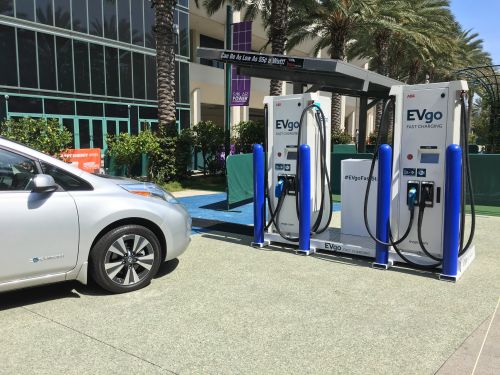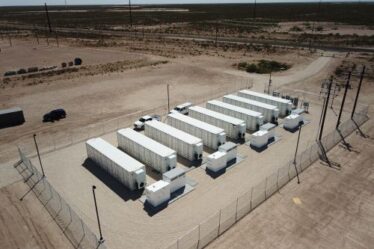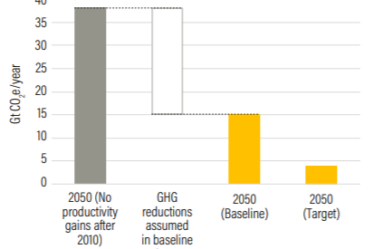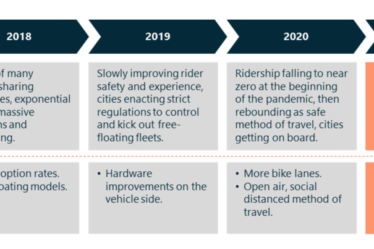
EVgo, which owns one of the United States’ biggest electric vehicle charging networks, is following in the footsteps of rival EV charging provider ChargePoint in seeking to become a publicly traded company via a special-purpose acquisition company (SPAC) reverse merger.
In EVgo’s case, its move to public markets will come along with a continuing financial relationship with its current owner: LS Power, one of the country’s biggest power generation, transmission and energy storage investors.
Under the terms of the deal announced Friday, EVgo will merge with Climate Change Crisis Real Impact I Acquisition Corp. (CRIS) in a transaction that will raise about $575 million, and value the company at about $2.6 billion.
The transaction will include a $400 million private investment in public equity anchored by institutional investors including private funds affiliated with Pacific Investment Management Company LLC, a CRIS co-sponsor, as well as funds and accounts managed by BlackRock, Wellington Management, Neuberger Berman Funds and VanEck Associates Corporation.
At the same time, LS Power and EVgo management, which today own 100 percent of EVgo, will roll all that equity into the transaction and are expected to own about 74 percent of the company when the deal closes, according to Friday’s announcement.
This offers LS Power a continued stake in what David Nanus, EVgo chairman and LS Power’s co-head of private equity, described in Friday’s announcement as a “crown jewel in our portfolio.”
Privately held LS Power owns more than 42 gigawatts of generation capacity across the country, much of it natural-gas-fired and coal-fired power plants. But it has taken an aggressive stance on renewable energy and energy storage projects over the past decade or so, following the energy sector’s general shift into domains that are increasingly cost-competitive against traditional power plants.
Booming demand for EVs and charging infrastructure
EV charging could be considered the next major growth opportunity in the electric power sector. While EVs made up only 2.6 percent of global automotive and heavy-duty vehicle sales last year, that share is set to grow to nearly 14 percent by 2030, according to consultancy Wood Mackenzie.
Government mandates to electrify transportation to meet decarbonization goals are the primary driver, including in much of Europe and Asia and a growing number of U.S. states, led by California and New York. But EVs are also becoming increasingly cost-competitive against internal-combustion-engine vehicles, particularly when adding fueling costs into the calculation.
“Just a few years ago, electric vehicles were considered niche,” said EVgo CEO Cathy Zoi in Friday’s announcement. “Today, improved technology, lower costs, greater selection, and a better appreciation for the performance of EVs is increasingly making them the vehicle technology of choice.”
These factors are set to drive massive demand for EV charging infrastructure over the coming decade. WoodMac predicts a roughly tenfold increase by 2030 in the roughly 3.3 million EV chargers across the U.S., European and Asian markets.
The election of President Joe Biden is also expected to lead to a significant increase in policies to support the build-out of EV charging infrastructure to help decarbonize the transportation sector.
EVgo’s convoluted history
EVgo has built a leading position in public EV charging since its 2010 launch by nationwide utility and energy company NRG Energy. Much like Electrify America, the EV charging network launched out of the Volkswagen Dieselgate scandal, NRG’s creation of EVgo was driven by its obligation to invest in public charging infrastructure when it acquired natural-gas plants owned by Dynegy. NRG installed its first major deployments as part of a settlement agreement in California, as well as in commercial settings in Texas.
NRG sold control of EVgo to Vision Ridge Partners, a sustainably minded investment firm, in 2016, and LS Power bought it in 2019. It now claims the country’s largest fast-charging network, with more than 800 fast-charging locations in 67 major metropolitan markets across 34 states serving more than 220,000 customers.
EVgo’s roots at NRG appear to be coming full circle with its SPAC plans. David Crane, the CEO of CRIS, the SPAC vehicle that held its initial public offering in September, is the former CEO of NRG. Crane led the company’s push into renewable and distributed energy, before being ousted during the company’s turn away from that vision, which included the sale of EVgo.
“We spent a substantial amount of time conducting extensive due diligence on EVgo, affirming our belief of its enduring first-mover advantage,” Crane said in Friday’s statement. “It has a distinct and highly advantageous owner-operator business model, supported by strategic partnerships with key industry players singularly focused on an essential and growing factor necessary for supporting widespread EV adoption.”
Rising competition, SPAC activity in the electric vehicle space
Besides Electrify America and Blink Charging, the publicly traded company operating and expanding the network of chargers originally deployed by bankrupt startup Ecotality, EVgo’s biggest competitor in the U.S. is ChargePoint. The Campbell, Calif.-based company announced its own SPAC deal in September, planning to merge with Switchback Holdings in a transaction expected to yield about $493 million in capital that will value the company at $2.4 billion.
SPACs have emerged as a favored alternative to an initial public offering for companies seeking to raise public market financing to scale up quickly. In the Sept. 14 episode of The Interchange podcast, Shayle Kann, managing director at utility-backed investment fund Energy Impact Partners, named at least 10 cleantech-related companies that had sought SPAC deals as of that time.
Since then, the list has grown to include EV charging and vehicle-to-grid technology provider Nuvve, aqueous zinc battery maker Eos Energy Storage, behind-the-meter battery installer and software provider Stem, electric bus and heavy-duty vehicle drivetrain and charging system provider Proterra, and EV makers Faraday Future and Lucid Motors.



